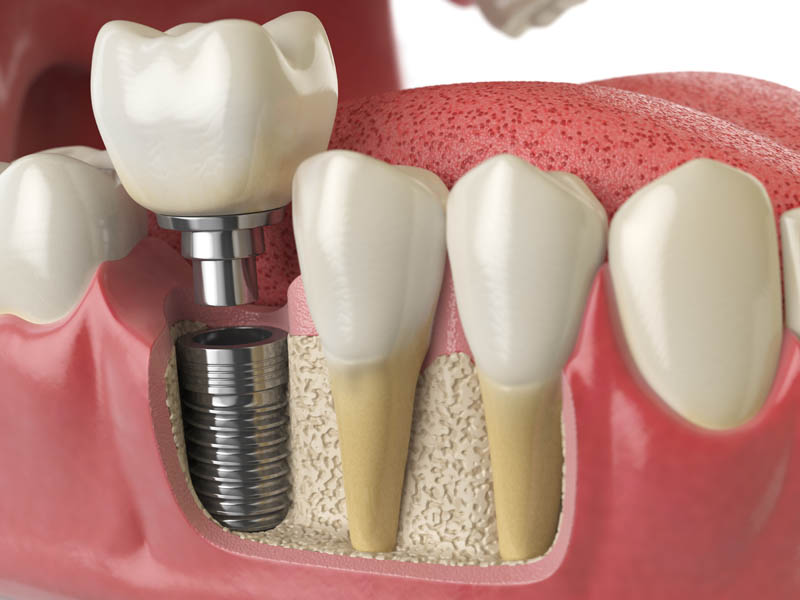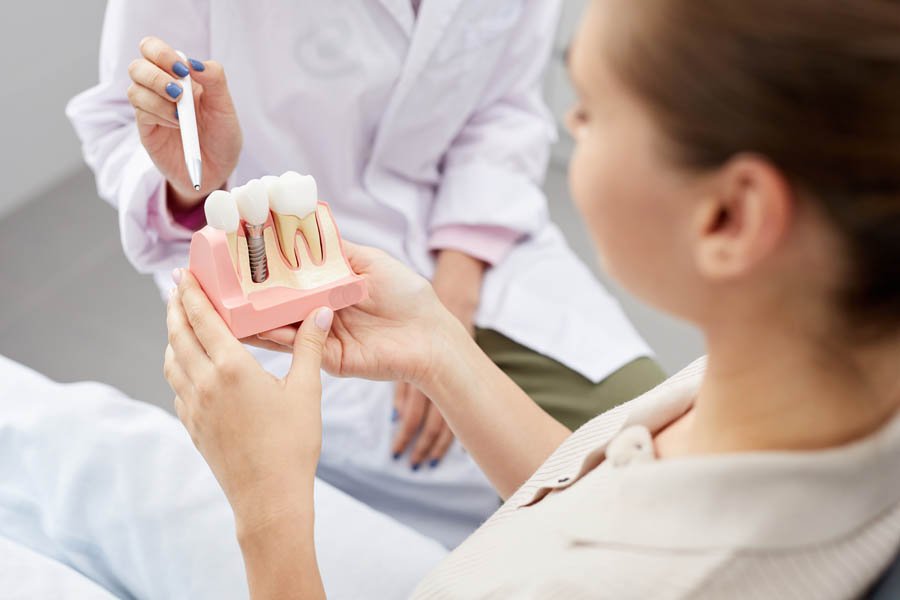New Patients
(281) 205-4019
Existing Patients
(281) 994-7346

At SKY Periodontics & Implant Dentistry, we understand how missing teeth can impact your overall health, confidence, and quality of life. Fortunately, dental implants offer a reliable and long-lasting solution to replace lost teeth and restore your smile. Whether you are missing one tooth, multiple teeth, or need a full set of replacements, dental implants provide a stable, functional, and aesthetically pleasing option.
Dental implants are small titanium posts that are surgically placed into the jawbone to serve as artificial tooth roots. These posts are designed to bond with the natural bone in a process known as osseointegration, providing a strong foundation for replacement teeth such as crowns, bridges, or dentures. Unlike traditional dentures, which can slip or cause discomfort, dental implants are permanent and function like natural teeth.
The dental implant process is a multi-step procedure, but the results are well worth it for patients looking to regain their ability to eat, speak, and smile confidently. The benefits of dental implants extend far beyond aesthetics; they improve functionality, prevent bone loss, and offer a more natural feel compared to other tooth replacement options.
There are several reasons why dental implants are considered the gold standard in tooth replacement:


The dental implant process involves several steps, which may vary depending on the individual patient's needs. Below is an overview of the typical stages of the procedure:
Proper care and maintenance are key to ensuring the longevity and success of your dental implants. While dental implants are designed to be durable and long-lasting, good oral hygiene and regular visits to your periodontist are essential for keeping them in optimal condition. Here's what you need to know to maintain your implants and ensure they function properly for years to come:
While dental implants are a highly effective and safe procedure, as with any medical treatment, there are some risks and potential complications. However, the overall success rate for dental implants is very high, and most patients experience excellent results. It is important to be informed about these potential risks and work closely with your periodontist to minimize complications.
While the risks associated with dental implants are minimal, it's essential to discuss any concerns or pre-existing health conditions with your periodontist before proceeding with treatment. Your periodontist will ensure that you are a good candidate for dental implants and will take all precautions to minimize any potential complications.
By working closely with a skilled and experienced periodontist, the risks associated with dental implants can be minimized, ensuring a successful, long-lasting result for your smile.


There are several types of dental implants available, each designed to meet the unique needs of different patients:
If you are missing a single tooth, a single dental implant can be used to replace the missing tooth and restore the function and appearance of your smile. The implant is placed directly into the jawbone, and a custom crown is attached to complete the restoration.
For patients missing multiple teeth, implant-supported bridges provide a secure, stable solution. Implants are placed at either end of the missing teeth area, and a custom bridge is attached, filling the gap and restoring your ability to chew and speak comfortably.
For patients with full tooth loss, implant-supported dentures offer a permanent and secure alternative to traditional dentures. Implants are placed in the jawbone to support a full set of dentures, allowing for greater stability, comfort, and chewing ability.
Dental implants may be an ideal solution if you are missing teeth and in good overall health. However, the best way to determine if dental implants are right for you is to schedule a consultation with our skilled periodontist at SKY Periodontics & Implant Dentistry.
During your consultation, we will evaluate your oral health, jawbone density, and other factors to create a personalized treatment plan tailored to your specific needs. Whether you're seeking to replace a single tooth or multiple teeth, we are here to help you achieve a healthier, more beautiful smile with dental implants.
The cost of dental implants varies depending on factors such as the number of implants needed, any additional procedures (such as bone grafting), and the type of restoration used. We will provide you with a detailed estimate after your consultation.
Yes, dental implants are safe and have been used successfully for decades. The materials used in dental implants, such as titanium, are biocompatible and naturally integrate with the bone, ensuring a long-lasting solution.
With proper care and regular check-ups, dental implants can last a lifetime. The replacement tooth (crown) may need to be replaced after several years, but the implant post itself is permanent.
The dental implant procedure is typically performed under local anesthesia, ensuring that you are comfortable throughout the surgery. Some mild discomfort and swelling may occur during the recovery period, but this is usually temporary.
The dental implant process can take several months to complete, including the healing time for osseointegration. However, the process varies depending on the number of implants, the need for bone grafting, and your individual healing response.
If you have gum disease, it must be treated before proceeding with dental implants. Gum disease can lead to bone loss, which may affect the success of the implant. Our team will work with you to address any gum health issues before moving forward with implants.
Unlike dentures, which are removable and can slip or cause discomfort, dental implants are permanent fixtures that are securely anchored in the jawbone. They offer improved stability, comfort, and function.
If your jawbone has been damaged or has insufficient density to support a dental implant, bone grafting may be necessary. We will assess your bone health during the consultation and recommend any additional procedures if needed.
Yes, once your dental implants are fully integrated and your restoration is in place, you can eat and chew normally. Implants function like natural teeth, allowing you to enjoy a wide variety of foods.
Many insurance plans offer partial coverage for dental implants. We will work with you to determine your insurance benefits and provide financing options if needed.
